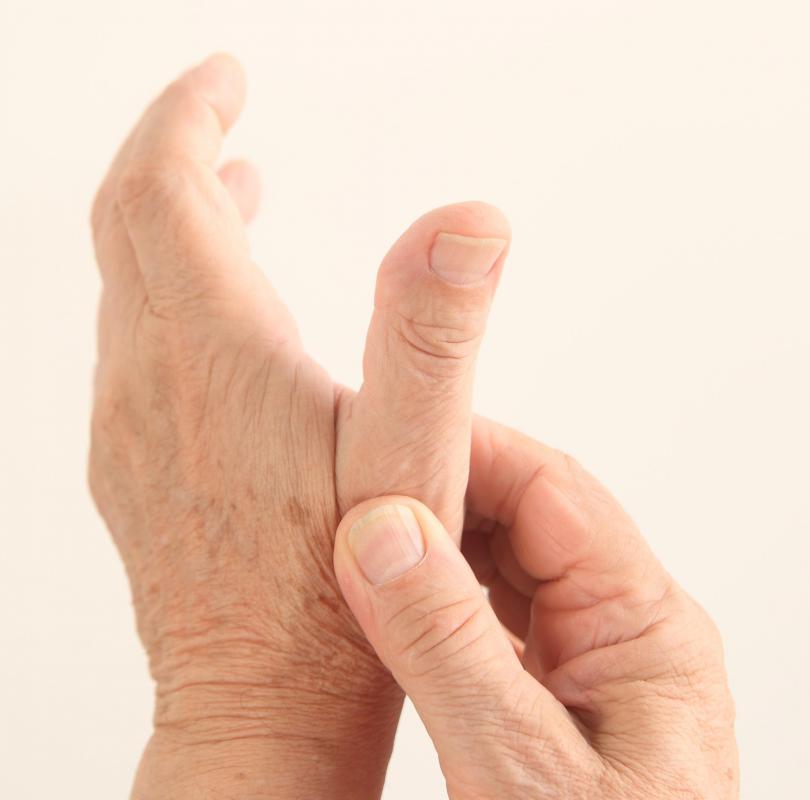At WiseGEEK, we're committed to delivering accurate, trustworthy information. Our expert-authored content is rigorously fact-checked and sourced from credible authorities. Discover how we uphold the highest standards in providing you with reliable knowledge.
How Effective Is Cortisone for Arthritis?
The use of cortisone for arthritis is common and considered very effective, but there are side effects to the medication. It can be taken orally, inhaled, given intravenously or injected directly into the problematic joint tissues. When using cortisone for arthritis, the preferred method is a local injection to treat small areas as is usually the case for osteoarthritis or systemic injections for inflammation that is more widespread as in rheumatoid arthritis.
Arthritis is the inflammation of the joints which causes symptoms such as stiffness and joint pain. There are different types of arthritis, but the most common are rheumatoid arthritis and osteoarthritis. Rheumatoid arthritis is an autoimmune disorder whose cause is unknown. The use of corticosteroids, a class of drug which includes cortisone, is designed to reduce inflammation and suppress the immune system.

Osteoarthritis occurs when the cartilage between the bones degenerates gradually, and the bones rub together. This happens most often in the hands, spine, knees and hips. In extreme cases of erosion where there is very little cartilage left, injecting cortisone for arthritis into the joints can be very painful but otherwise, if the procedure is done professionally, the injection should be painless with only some slight discomfort. While there are few drug interactions when cortisone is injected, care should be taken if the patient is already on anticoagulants, anticonvulsants and anti-diabetes medications as well as non-steroidal anti-inflammatory drugs such as ibuprofen.

Injecting cortisone directly into an arthritic joint leads to a rapid reduction in pain and a restoration of function to the affected area. While the local effect is usually immediate, there is also a decrease in the inflammation of other joints around the body once the cortisone is absorbed into the blood stream and circulated. However, there are some side effects, though these are not common. There could be injury to the joint tissues especially if the cortisone is injected too often and over a long period of time. Other long-term complications include weight gain, high blood pressure, infection, bleeding and osteoporosis.

There may a lightening of the skin around the injection site, soreness and a worsening of the inflammation rather than a reduction. This is due to a post injection cortisone flare. These are usually short-term complications. The current debate concerning using cortisone for arthritis centers around concerns that cortisone is a quick fix remedy but has little to offer in terms of long term healing. Furthermore, if the drug is not controlled and taken only up to four times a year, then the chances of developing complications increase.
AS FEATURED ON:
AS FEATURED ON:
















Discussion Comments
@ysmina-- That's the thing, cortisone isn't a cure for arthritis, or anything else really. Yes, the relief can last some time, but it will wear off after that. So it's not a permanent solution and is really a last resort.
Especially diabetics or those who are pre-diabetic need to be careful with extended cortisone treatment. Cortisone increases blood sugar, so it may trigger diabetes in those who are pre-diabetic. And diabetics need to keep a close eye on their blood sugar and adjust their medications accordingly.
@discographer-- Cortisone can have side effects, but those side effects are usually problem when cortisone is used for a long time and in very high doses. Most people do not experience severe side effects from a single cortisone treatment. But that treatment can provide considerable relief from inflammation and pain.
My grandmother has arthritis in her knees. She received cortisone injections in her knees and she has been pain free for a year now. Some people experience pain relief for even more than a year. She said that the injections weren't very painful and aside from some water retention, she didn't have major side effects. Before cortisone treatment, she had trouble walking and now she can climb stairs. So the cortisone has done wonders for her.
I have arthritis and my doctor wants to do cortisone injections to relieve my pain. I'm not agreeing to it because I hate injections and I've heard so much about the negative side effects of cortisone. But I would still like to hear about others' experiences.
Has anyone here used cortisone for arthritis? Do you think it was worth the side effects?
Post your comments